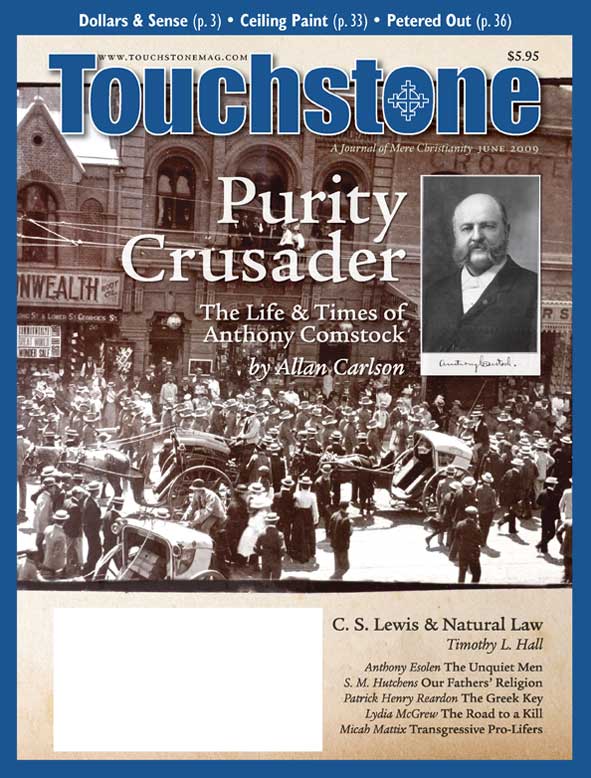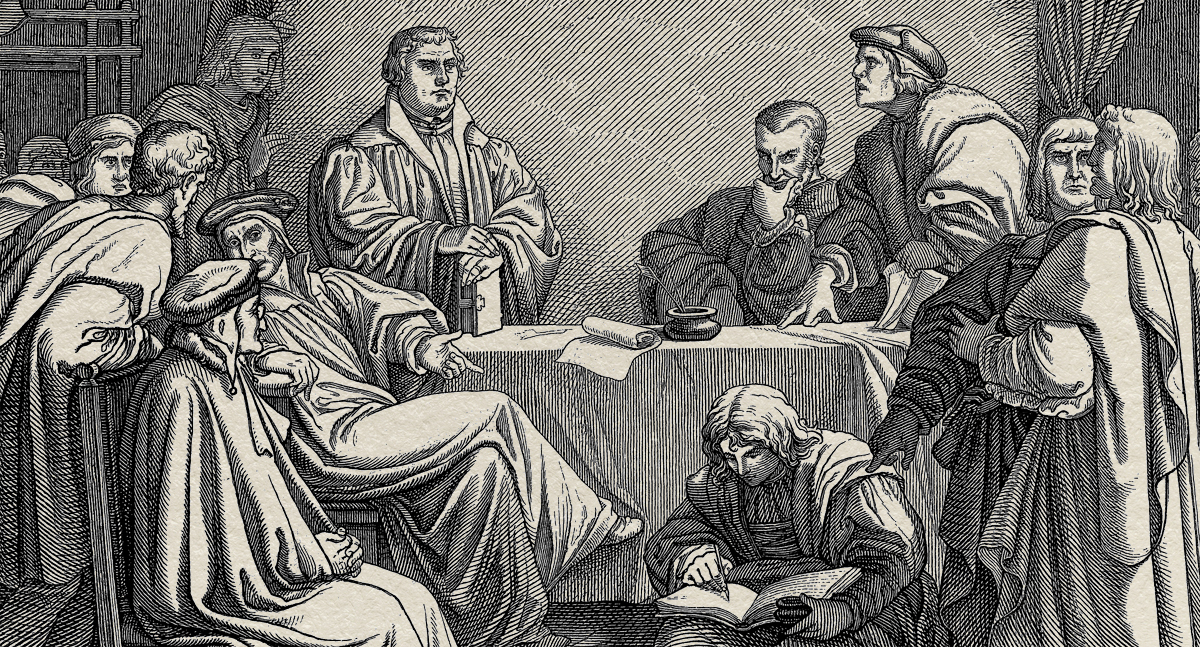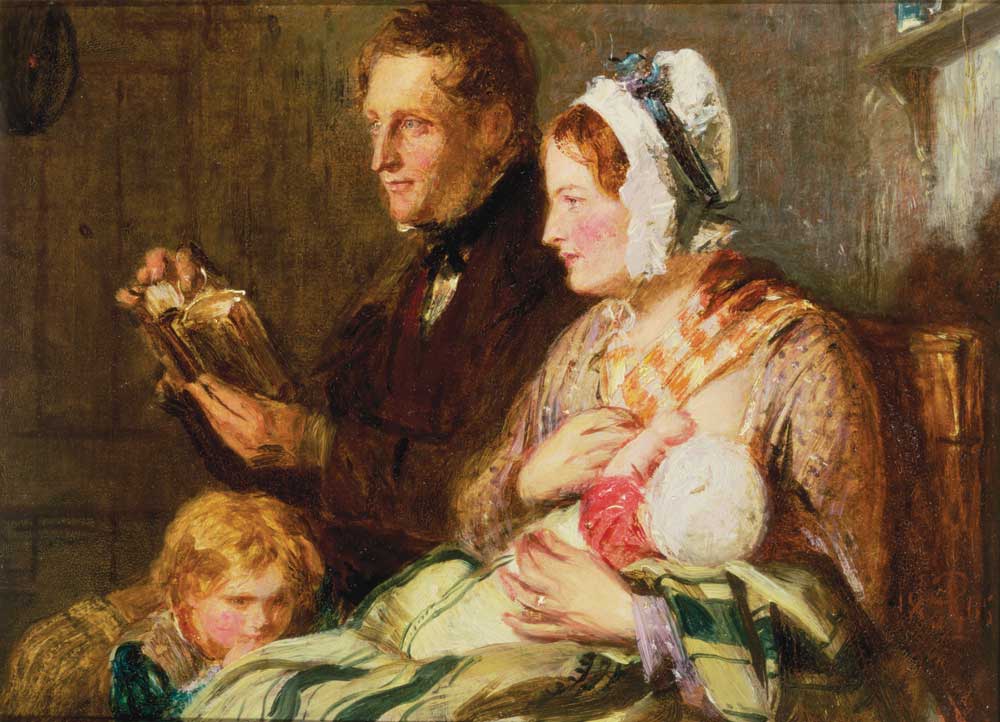Feature
A Law for All Seasons
C. S. Lewis on Civilization & the Natural Order
In G. K. Chesterton’s first Father Brown story, “The Blue Cross,” criminal mastermind Flambeau has lured Father Brown to a desolate height on Hampstead Heath as the last act in his plot to steal a jeweled cross. Flambeau is disguised as a priest, and before he discloses his true identity, he and Father Brown discuss moral reason.
Flambeau insists that the universe is too wild a place to be governed by any single concept of reason or justice. “Who can look at those millions of worlds,” he asks as twilight encroaches on the last light of day, “and not feel that there may well be wonderful universes above us where reason is utterly unreasonable?” Father Brown, however, sniffs bad theology in this attack on the reasonableness of reason, and he responds:
Reason and justice grip the remotest and the loneliest star. Look at those stars. Don’t they look as if they were single diamonds and sapphires? Well, you can imagine any mad botany or geology you please. Think of forests of adamant with leaves of brilliants. Think the moon is a blue moon, a single elephantine sapphire. But don’t fancy that all that frantic astronomy would make the smallest difference to the reason and justice of conduct. On plains of opal, under cliffs cut out of pearl, you would still find a noticeboard, “Thou shalt not steal.”
Life in Babel
The modern mind is not happy with the prospect of signs such as Father Brown imagines. Contemporary legal theory, in particular, tends to side with Flambeau against Father Brown. Each world, each society, creates its own legal signs, and the content of these signs varies so significantly that some observers appropriate Babel as a metaphor for our collective human condition.
Oliver Wendell Holmes, Jr., one of the most famous American legal lights of the twentieth century, scoffed at the idea of a “brooding omnipresence in the sky,” that is, of notions of right and justice that existed prior to and distinct from the particular laws enacted by each jurisdiction, which we call positive laws. Lawmakers, he believed, devise laws always and only because the content of particular laws suits them, not because these laws mirror any principles of natural justice. Insofar as one judges that laws are an expression of particular values, Holmes insisted that values themselves are “generalizations emotionally expressed,” without “transcendental sanction.”
This view of the law, which inspired the so-called legal realist movement in American legal scholarship of the 1930s and early 1940s, is sometimes referred to as “legal positivism,” and it came to dominate American jurisprudence during the twentieth century. It supplanted as reigning theory, though it did not extinguish, the natural law tradition, according to which positive laws find their legitimacy through their correspondence with objective moral principles or “higher law.”
I intend to consider briefly what C. S. Lewis’s writings might contribute to those contemplating the creation of law in the precincts of Babel. In particular, I seek to discern what counsel Lewis might offer to religious believers about their role in the creation of law through the political process.
Life in the precincts of Babel can be frustrating, and frustration with the possibility of public discourse has driven some religious believers either to retreat from the public square or to attempt to dominate it. Some observers, like Stanley Hauerwas, contend that significant participation in the political process is now impossible because of the collapse of a common moral language, and that, therefore, believers should henceforth retire to communities of faith in which they may live out the principles of those communities.
Others, however, favor the imposition of theocratic solutions of one sort or another on our fragmented moral condition. Those of this mind are anxious to see divine commands, as revealed in Scripture, incorporated into legal norms and enforced through the power of the state, so that the voice of the law is essentially the biblical “Thus says the Lord.”
The Law of Nature
Lewis rejected both of these alternatives by denying that we inhabit Babel. He insisted that human beings, across lines of time and culture, share a good many common moral principles, and that our moral vision is not so fragmented as some social observers have contended. Furthermore, through his occasional writings on a variety of public subjects, Lewis demonstrated that civil discourse, including discourse related to the creation of positive law, might proceed along rational lines by resort to these principles.
In his essay, “The Poison of Subjectivism,” he called the suggestion that the ethical traditions of different cultures differ so radically that no common tradition exists “a good, solid, resounding lie.”
If a man will go into a library and spend a few days with the Encyclopedia of Religion and Ethics he will soon discover the massive unanimity of the practical reason in man. From the Babylonian Hymn to Sams, from the Laws of Manu, the Australian aborigines and Redskins, he will collect the same triumphantly monotonous denunciations of oppressions, murder, treachery and falsehood, the same injunctions of kindness to the aged, the young, and the weak, of almsgiving and impartiality and honesty.
In fact, in his most significant defense of natural law principles, The Abolition of Man, Lewis chose to name them the Tao, thus reiterating that natural law was not a specifically Christian or even Western concept, but a common heritage of humanity.
Calling Men Back
One of Lewis’s main projects, as he described it in “On Ethics,” was that of “recalling men to traditional morality.” He viewed this effort as a necessary preface to serious evangelism, believing that modern society, in its drift away from recognizing the Law of Nature, had drifted away also from the sense of guilt necessary for recognizing the need for a Savior.
When first approached by the BBC to broadcast a series of talks during World War II, Lewis chose to focus on this natural law, explaining to Dr. James W. Welch of the BBC that it was no longer possible to assume that people believed in the Law of Nature and that they had disobeyed it. Thus, his first series of talks—later to become the first section of Mere Christianity—were, as he described them to Sister Penelope CSMV in 1941, “ praeparatio evangelica rather than evangelium.” They attempted “to convince people that there is a moral law, that we disobey it, and that the existence of a Lawgiver is at least very probable and also ( unless you add the Christian doctrine of the Atonement) imparts despair rather than comfort.”
Lewis also advocated a return to traditional morality as a basis for reflection about ethics generally and law in particular. In essays on vivisection and theories of criminal punishment, for example, he appealed to fellow citizens on the basis of natural-law thinking rather than biblical prescription. Some readers of Lewis’s apologetic and fictional works may be surprised to discover how frequently he wrote to broad audiences on general social and cultural topics of the day, seeking to find agreement with readers across a wide spectrum of belief and unbelief, hopeful, as he wrote in “Lilies that Fester,” that “many atheists and agnostics care for the things I care for.”
Lewis was able to imagine an apocalyptic future, best represented in That Hideous Strength, the third book in his science fiction trilogy, in which a common appreciation of the Tao might come close to extinction. The last chapter of The Abolition of Man prognosticates a similar future, although Lewis’s dark future does not resemble a post-modern Babel so much as it does George Orwell’s 1984. Whether Babel or 1984, however, Lewis feared that the contemporary world might one day find itself cut off from the Tao.
I think we might reasonably ask whether the passage of nearly four decades since his death has seen the realization of his fears. Certainly it is fair to say that the kind of moral realism Lewis championed is on poorer footing today than it was when he delivered the Riddle Lectures (which became the basis for The Abolition of Man). But I doubt whether Lewis himself would have seen this as an appropriate moment to abandon public appeals to the Law of Nature.
Against Theocracy
The generation in which Lewis lived witnessed two world wars and their attendant atrocities, and many of his contemporaries came to believe that only a restoration of “Christian” values would save Western civilization from a descent into barbarism. Lewis shared the sense that the modern world was near the point of losing its way because it had lost its grip on traditional morality, but he denied that this morality was distinctly Christian. He labored to dismantle the moral monopoly claimed by some Christians by insisting that the Law of Nature was “neither Christian nor Pagan, neither Eastern nor Western, neither ancient nor modern, but general.”
Even more dangerous than this monopoly, though, were attempts to make God a kind of political party chairman. Lewis condemned theocracy scathingly, though he did not use this term as promiscuously as some contemporary American observers, who appear willing to brand virtually any involvement by conservative Christians in political affairs as a form of theocracy. In his condemnation of the theocratic impulse, Lewis was not denying that God is the rightful sovereign over the world and its kingdoms, any more than he would have contemplated a Narnia in which Aslan and the Emperor-Over-the-Sea were not sovereign.
For Lewis, theocracy is the attempt to exercise political power in the name of God, to confuse the ordinary world of politics with the kingdom of God. It is the apostate cleric, Straik, in That Hideous Strength who insists that “the Kingdom of God is to be realised here—in this world.” Lewis regarded this aspiration as particularly dangerous. Theocracy, he maintained, invites its own special brand of tyranny. “If we must have a tyrant,” he wrote in “A Reply to Professor Haldane,” a robber baron is far better than an inquisitor:
The baron’s cruelty may sometimes sleep, his cupidity at some point be sated; and since he dimly knows he is going wrong he may possibly repent. But the inquisitor who mistakes his own cruelty and lust of power and fear for the voice of Heaven will torment us infinitely because he torments us with the approval of his own conscience and his better impulses appear to him as temptations. And since Theocracy is the worst, the nearer any government approaches to Theocracy the worse it will be.
On occasion, he was event more blunt. “I believe in God,” he wrote in “Is Progress Possible,” “but I detest theocracy. For every Government consists of mere men and is, strictly viewed, a makeshift; if it adds to its commands ‘Thus saith the Lord’, it lies, and lies dangerously.”
Christian Party Pitfalls
Lewis’s opposition to theocracy extended—though with less vehemence—to forms of specifically Christian political activism such as the formation of a “Christian” party or the articulation of a “Christian” political platform. In That Hideous Strength, for example, the genial skeptic, McPhee, tells Ransom at one point, “If you had taken my advice six months ago we would have had an organization all over this island by now and maybe a party in the House of Commons.” McPhee knows enough to realize, however, that Ransom disapproved of this kind of political activity.
In his “Meditation on the Third Commandment,” Lewis displayed a similar disapproval of schemes to create a Christian party in British politics. Two aspects of such schemes disturbed him.
First, he recognized the divergent political views of Christians on different points of the political spectrum (as illustrated, for one example, by Charles Colson on the right and Ron Sider on the left), and he denied that any one perspective had the authority to speak on behalf of Christianity as a whole. Second, he feared the introduction of religious zeal and certainty to the world of politics and law, of “pretending that God has spoken when He has not spoken.”
He will not settle the two brothers’ inheritance: “Who made Me a judge or a divider over you?” [Luke 12:14] By the natural light He has shown us what means are lawful: to find out which one is efficacious He has given us brains.
Here, then, Lewis opposes the theocratic impulse, even in a more muted form, in favor of a focus on natural law (“natural light”) and the deductions we may properly draw from it.
“Mere” Natural Law
While Lewis insisted on the existence of the Law of Nature, accessible to believer and unbeliever alike, he never attempted to set forth or defend a system of natural law. In his essay “On Ethics,” he specifically confessed that his aim was more “timid” than that of reintroducing “in its full Stoical or medieval rigour the doctrine of Natural Law.” He commented favorably concerning, but never attempted to duplicate, what he referred to in that essay as the “the richly articulated codes of Aristotle, Confucius, or Aquinas.” (Today he might add to this list the “new natural law” championed by Germain Grisez, John Finnis, Joseph Boyle, and Robert George, among others.)
He thus advanced a relatively “thin” idea of natural law, as opposed to the “thicker” understandings of natural law characteristic of, say, some Catholic natural-law theorists, or the more fully developed accounts of natural law in works such as J. Budziszewski’s What We Can’t Not Know. In essence, he advanced what we might call a “mere” natural-law theory, reminiscent of the “mere Christianity” of which he was such an able apologist.
Of course, this project has the same drawbacks as Lewis’s emphasis on “mere Christianity.” The Lutheran theologian ready to make sharp distinctions between “orders of creation” and national-law theory, especially in its Catholic formulation, may be exasperated with Lewis’s unwillingness to explore the deeper implications of our fragmented and frequently errant moral sense. Reformed thinkers, reluctant to credit our sin-scarred intellect with any capacity for moral deduction, may wonder what practical usefulness there is in Lewis’s concept of the Tao.
No Surrender
Lewis, though, declined to enter very deeply into these theological discussions, other than to reject as unbiblical any suggestion that sin had completely disabled man’s knowledge of the Law of Nature. He argued that Scripture “does not encourage us to believe that our knowledge of the Law has been depraved in the same degree as our power to fulfil it.”
Our righteousness may be filthy and ragged; but Christianity gives us no ground for holding that our perceptions of right are in the same condition. They may, no doubt, be impaired; but there is a difference between imperfect sight and blindness.
Beyond this observation, though, Lewis stands apart from most theological arguments about natural law. Here, as in his apologetics, I think he would disclaim any interest in subverting serious debate about or attempts to elaborate a system of natural law. He would insist, nonetheless, that collectively, believers would be helped in their attempt to live side-by-side with unbelievers in any given political system by refusing to surrender the idea of a common morality, a Law of Nature, God’s law, written on the human heart, as Paul describes it in Romans 2:14–15.
This, after all, was the task of religious believers: “The practical problem of Christian politics,” he wrote in “The Humanitarian Theory of Punishment,” “is not that of drawing up schemes for a Christian society, but that of living as innocently as we can with unbelieving fellow-subjects under unbelieving rulers who will never be perfectly wise and good and who will sometimes be very wicked and very foolish.”
Alternative to Retreat
Lewis’s “mere” natural law offers an alternative to the retreat of believers from the public square into isolated communities of faith. It ought to fortify them against succumbing to a kind of postmodern timidity that hesitates to address moral issues in the public sphere out of fear that our Babel-like circumstances make reasonable discourse impossible. If anything, the withdrawal of reasonable religious voices from the public square will inevitably hasten the arrival of Babel.
Moreover, if the principles of the Law of Nature are accessible to our unbelieving fellow citizens because they are written on those citizens’ hearts, then we have a basis for talking with them about the moral concerns relevant to the creation of law. Without this basis, we are left with the prospect of pummeling these unbelievers with biblical texts whose authority they do not accept—a strategy of communication with little prospect of success and, more importantly, little correspondence with New Testament examples of how the apostles communicated with Gentile unbelievers.
The apostles’ practice was to begin with some point of reference accessible to their hearers. The Law of Nature, Lewis demonstrates, is precisely such a point of reference shared by both believers and unbelievers, and therefore available as a basis for the kinds of public communication necessary to the creation of law.
In the preface to Mere Christianity, Lewis likened his aim to that of someone introducing guests to the hall of a great house, with doors opening into the several rooms of various Christian communities. The hall, he cautioned, might be a place that one waited in for a time, but it was not a place for living; it was the rooms that contained “fires and chairs and meals.” And so he urged his readers not to tarry unduly in the hall of “mere” Christianity, but to find their way into one of the rooms of the household of faith.
Meeting in the Hall
“Mere” natural law may be likewise understood as a hall from which one may enter into any of several rooms, all of which share a common belief in the law written on the human heart—whether described as common grace, orders of creation, or natural law—but elaborating in different ways the content, application, and significance of this law.
In one way, though, Lewis’s analogy of the common hall may counsel different advice regarding “mere” natural law. There is cause for the residents of the various rooms of natural law to come back into the main hall from time to time: There they may discover allies they may not previously have recognized, and there they may also consider how they might work together, as Lewis did, to recall a civilization back to the Law of Nature. •
Sidebar
Woe to That Nation
by Anthony Esolen
Speaking in New Zealand in December 2005, Chief Justice Beverly McLachlin of the Canadian Supreme Court described the criteria for discerning what she called “a new natural law.” Her statements evinced that soft narcotic blurring of categories that people find so useful when they wish to arrogate an authority that is not properly their own. “The rule of law,” she said, “requires judges to uphold unwritten constitutional norms, even in the face of clearly enacted laws or hostile public opinion.”
Note that
she did not identify constitutional mandates, or constitutional prohibitions,
but constitutional “norms,” the meta-constitutional values that are
supposed on certain nights to animate the actual written constitution, which
would otherwise be a dead letter. These “norms” are, conveniently,
unwritten, requiring a special sense, a knack, to discover not only what
they are, but that they are at all.
And how do you discover what they are? Says the Judge: “Where, having regard
to convention, written provisions and internationally affirmed values, it is
clear that a nation and its people adhere to a particular fundamental principle
or norm, then it is the court’s duty to recognize it.”
A Contradiction in Terms
Now before we look at what the reasoning here is, it is helpful to notice what it is not. It is not an appeal to written law. It is not an appeal to immutable justice. It is not an appeal to reason. Indeed, it does appeal to a kind of positivism—the reverse of natural-law theory; the people may as a plain matter of fact adhere to a norm whether they know it or not, and, presumably, whether they like it or not.
Recall that the Judge is championing “a new natural law.” A new natural law? The phrase is a contradiction in terms. If by “natural law” we mean the moral law written upon the heart of man, ineradicable from his nature as a rational being, and discoverable by all men at all times through the use of their practical reason, then unless the nature of man changes, the natural law cannot change. But man’s nature has not changed; he is still that biped with the dim ray of intellect. Then a “new natural law” cannot be the natural law, but something else, something with a nice rhetorical ring to it, something that can take that law’s place in jurisprudential self-justification.
For whatever this “new natural law” is, it is not discoverable by reason alone, as is, for instance, the law that we should not do unto others as we would not have them do unto us. It does not apply to all men as men, in all places and times, precisely because it is “new.” It is therefore also mutable: Another Supreme Court Chief Justice might well get her back up and pronounce the discovery of a “new and improved natural law,” with stannous fluoride to help prevent tooth decay.
Of course, our understanding of the natural law can deepen, and in that sense, some people at some times may find its conclusions “new,” though the feeling of newness will come not from the law itself but from our spotty and inattentive knowledge of it. Such was, for instance, mankind’s shamefully belated concession that since none of us wishes to be enslaved, none of us should enslave anybody else, either.
The Judy Jetson Theory
Then why did the Judge not simply say, “a new
understanding of the natural law”? That’s an easy one. She does
not believe in the natural law. Look again at her criteria. “Written
provisions,” the one thing that
a constitutional lawyer should most attend to, are smuggled in between the
vague “conventions” and
the seemingly innocuous “internationally affirmed values.” Affirmed
by whom, where? And why should Canadians care, anyway?
This apparent handing over of a nation’s sovereignty to the courts of
other nations has been performed in the United States, too; erstwhile Justice
Sandra
Day O’Connor grew fond of it in her later years. I say “apparent” because
neither McLachlin nor O’Connor ever really considered throwing up her
hands and begging The Hague to decide anything. For those courts of other nations—other
cherry-picked nations—are all at the same time doing the same thing,
that is, apparently handing over their sovereignty to courts in places
like Canada
and the United States.
We might call this the Judy Jetson Theory of International Jurisprudence: “But Daddy, don’t be such a square! I just have to wear that miniskirt! It’s all the rage on Pluto. It’s the living end!” And the daughters of Pluto say it’s all the rage on Earth. Unlike Justice McLachlin’s natural law, some things never change.
Arbitrarily Assumed Authority
It is grimly amusing to note the example she uses to justify this betrayal of both the natural law and that poor old humble written constitution she is sworn to uphold. “If a state were to pass a genocidal law,” she wags her finger, “I think it would clearly be the duty of the judges to deny the law’s validity on the ground that it offended the basic norm that states must not exterminate their people.”
Well, Zipporah, come down off that mountain and tell us what else you saw! Dear me, we needed a “new natural law” to discover this? Would not the old natural law, the natural law discernible by reason, have done as well? Did not Aquinas flatly declare that a law such as the Justice supposes is no law at all?
But where, pray tell, does the natural law compel judges in their capacity as judges to undermine the sovereignty of the state and indeed the very idea of law by striking down, with arbitrarily assumed authority, the law that they deem unnatural? There are other courses of action, after all. Resignation, political action, and civil disobedience come to mind.
But Justice McLachlin will never be faced with a genocidal law, and she knows it. She uses the example of a violation of the natural law to secure her notion of a subjective new natural law, discernible by a cabal of jurists in Stockholm, Brussels, Ottawa, and wherever fine jewels are sold.
For whatever the new natural law is, it certainly doesn’t limit marriage to one man and one woman, and it certainly doesn’t protect the life of the unborn. Indeed, it champions the rights of people to engage in sodomy and to kill their offspring. These are not actions whose propriety is discoverable by reason, but so what? Daddy, everybody in the galaxy is doing it!
Timothy L. Hall is the president of Austin Peay State University. He is the author of several books, including Separating Church and State: Roger Williams in America (University of Illinois Press), and, most recently, Religion in America: Eyewitness Accounts (Facts on File). He and his wife live in Clarksville, Tennessee, where they attend a Southern Baptist Church.
subscription options
Order
Print/Online Subscription

Get six issues (one year) of Touchstone PLUS full online access including pdf downloads for only $39.95. That's only $3.34 per month!
Order
Online Only
Subscription

Get a one-year full-access subscription to the Touchstone online archives for only $19.95. That's only $1.66 per month!
bulk subscriptions
Order Touchstone subscriptions in bulk and save $10 per sub! Each subscription includes 6 issues of Touchstone plus full online access to touchstonemag.com—including archives, videos, and pdf downloads of recent issues for only $29.95 each! Great for churches or study groups.
Transactions will be processed on a secure server.
more on C. S. Lewis from the online archives
more from the online archives
calling all readers
Please Donate
"There are magazines worth reading but few worth saving . . . Touchstone is just such a magazine."
—Alice von Hildebrand
"Here we do not concede one square millimeter of territory to falsehood, folly, contemporary sentimentality, or fashion. We speak the truth, and let God be our judge. . . . Touchstone is the one committedly Christian conservative journal."
—Anthony Esolen, Touchstone senior editor













